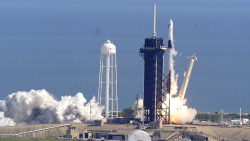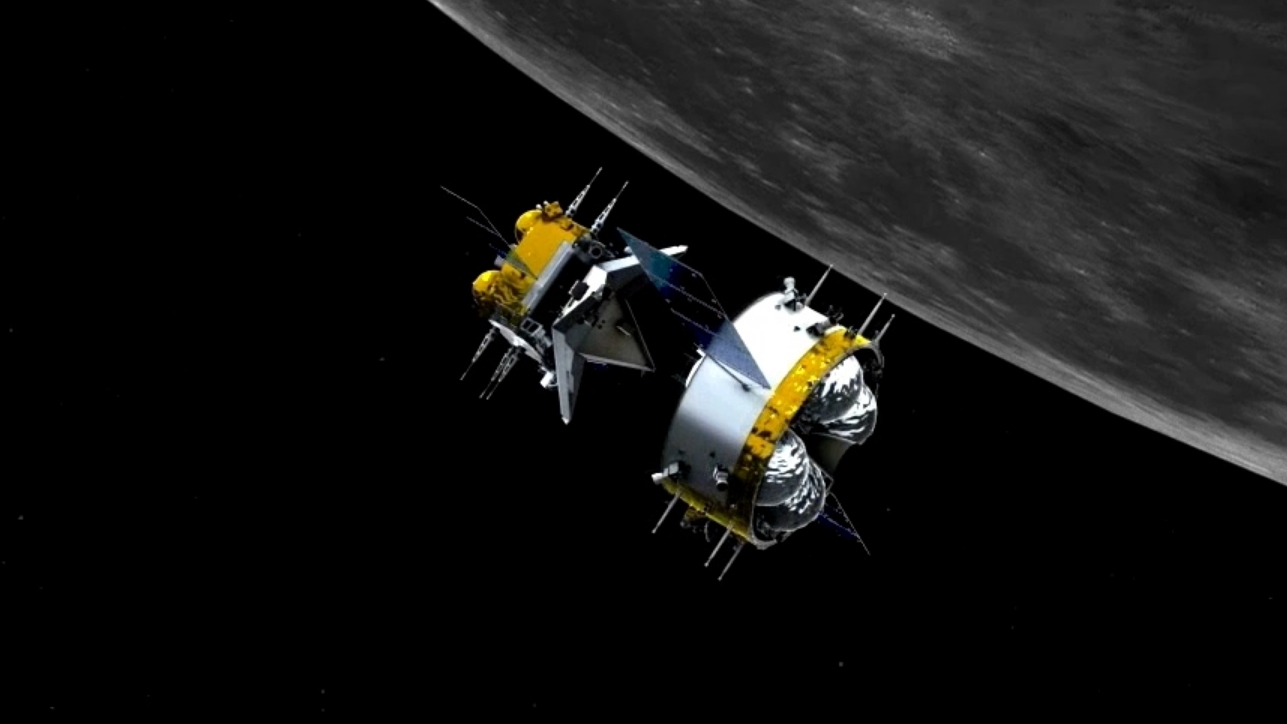
Editor's note: Shen Zhourong, a former aeronautical information service officer with the Air Traffic Management Bureau of the Civil Aviation Administration of China, is a lecturer at Beijing International Studies University. The article reflects the author's opinion, and not necessarily the views of CGTN.
If there is one thing that distinguishes China's herculean effort in expeditions to the moon from those made by the U.S. and the former USSR, it is China's launch which is one truly executed in the name of the advancement of humanity, unshaded by the cloud of the Cold War and an urge to demonstrate its prowess just to make other countries feel on edge.
The Chinese nation had always held a flame for the moon. The spacecraft, Chang'e, is named after the Chinese moon goddess, who legend says obtained immortality and has resided on the moon since her deification. Although it may be overly poetic to compare modern human attempts at understanding the universe and the secret of life by going to the moon with a legend, we should by no means underplay the overtones of scientific discovery for the benefit of all.
As the Chang'e-5 returns with the much-sought-after and youngest lunar sample, the international community is humming with excitement and aspiration to delve into its analysis, some more vocal than others.
Thomas Zurbuchen, associate administrator of NASA Science Mission Directorate wrote: "Congratulations to China on the successful landing of the Chang'e-5. This is no easy task. When the samples collected on the Moon are returned to Earth, we hope everyone will benefit from being able to study this precious cargo that could advance the international science community."
While Zurbuchen's wish is a bona fide expression of goodwill, the reality could be less forgiving. NASA is prevented from cooperating with China in space without congressional approval under the Wolf Amendment. Since then, NASA has been forbidden from sharing information with China, while Chinese scientists have been banned from attending conferences and collaborating with U.S. scientists.
The China exclusion policy has rendered any form of sharing and cooperation too much to hope for. If anything, the Wolf Amendment reminds us of the shameful Chinese Exclusion Act of 1882, which, crumbled in 1943 and was redressed by the U.S. Senate in 2012. There is no reason not to count on the Wolf Amendment going down the same path.
If history is any guide, the attempt by the U.S. to curb and exclude China never really worked: not with the trade embargos, and certainly not with astronautic cooperation. And China always emerged stronger from exclusion: it is now the champion of free trade and globalization and it made the commitment to not be the first to use an atomic bomb, casting the U.S. as a shadow of its former self. Now that it is banned from entering the International Space Station (ISS), China has set up its own Tiangong Space Station and has every intention of opening its arms to the 17 countries who have applied to be included.
In comparison to China's aeronautics, the nation's astronautic endeavor has long enjoyed smooth sailing and is widely acclaimed in the international astronautic community. The cooperation with China would surely hold great promise, not least because the Tiangong Space Station would be the only one in space when the current ISS retires in 2024. Also, the astronomical numbers required to build a space station is no easy feat for any country. Therefore, when there is one in place, the best way to use it is to use it.

A simulated illustration of Chang'e-5 probe's orbiter-returner's separation from the ascender on the moon orbit, December 6, 2020. /CNSA
A simulated illustration of Chang'e-5 probe's orbiter-returner's separation from the ascender on the moon orbit, December 6, 2020. /CNSA
Sadly, there are always parochial minds stuck with outdated mentalities who would paint everything with politics; and subtlety was not their strength.
"Knowledge without sharing is like a bird without wings," said a comment under Zurbuchen's Twitter post. While not mentioning the accusatory overtone and the unfounded assumption of China blockading science, they did not have the decency to see the wings.
"Data release and information Service System of China's Lunar Exploration Program" is right there for any scientist to access free of charge, not to mention the kind gesture of an English version. Now that they know China is indeed providing the wings, the stoic and simple website design of the information-sharing system may well end up being the next victim of aspersion. To quote ancient Chinese wisdom: where there is a will to condemn, evidence will follow.
Down this slippery slope of double standards that is revealed time and again, one would dangerously put ideologies and stereotypes before facts and good faith. Contrary to what ill-informed criticisms have suggested, China has never promulgated any exclusionary act of any sort or the targeting of any county, as opposed to what the U.S. did. It may take another decade for the U.S. to remove an ill-conceived exclusion act, but it is going to take so much more time for the deeply-entrenched stereotypes and fantasized antagonization to become a thing of the past.
The two countries need to start to genuinely appreciate each other and jointly allow the restless inquiring intelligence of humanity to flourish. In this precarious world, cooperation is the only way forward as suggested by the tackling of terrorism, climate change and the pandemic.
It is not China who is putting politics ahead of science. To quote a much-beloved first lady, "When they go low, we go high." And when China's gone as high as the moon, may the U.S. would be an "us," not as a coterie of technology hegemons, but as a team in a community open to all who are willing to advance humanity.
(If you want to contribute and have specific expertise, please contact us at opinions@cgtn.com.)

